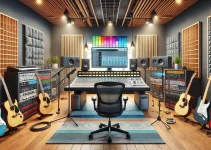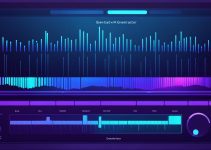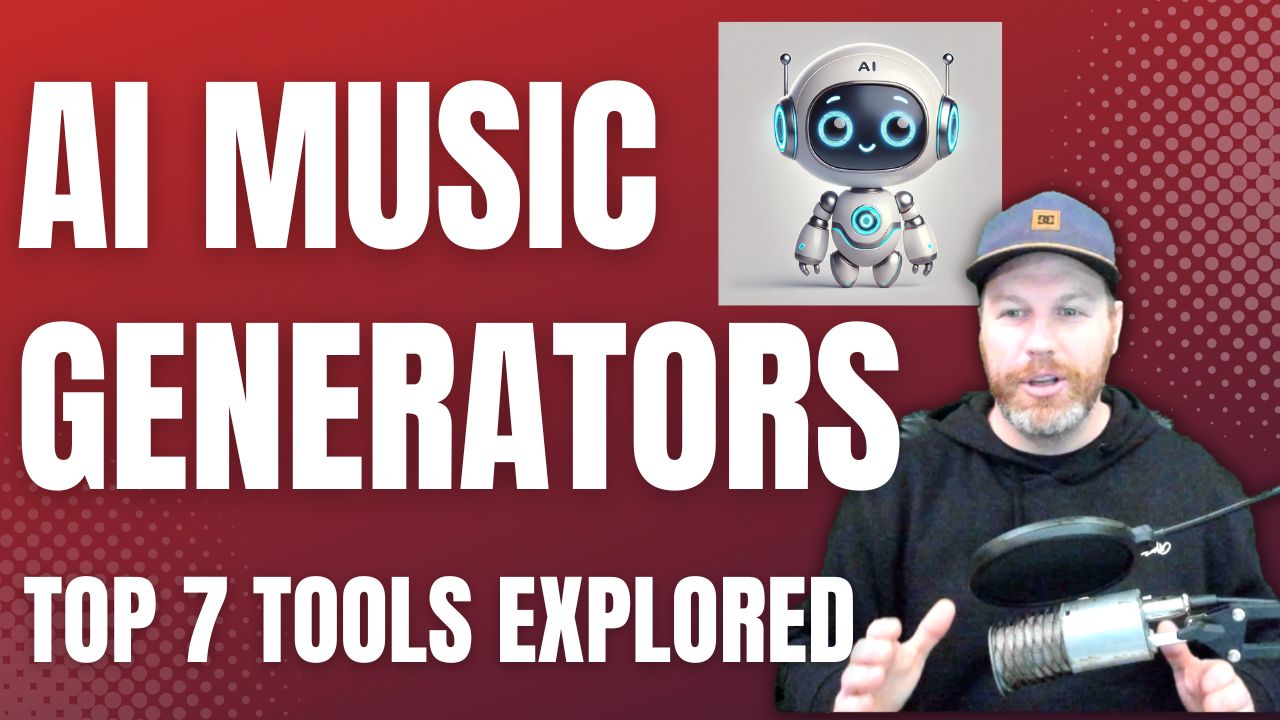 Have you ever thought about if computers could make a hit song? AI music composition is changing how we make and listen to music. It can create melodies and even whole songs, changing the music industry. But how can you use this tech to make your own music?
Have you ever thought about if computers could make a hit song? AI music composition is changing how we make and listen to music. It can create melodies and even whole songs, changing the music industry. But how can you use this tech to make your own music?
Now, machine learning music tools are for everyone, from hobbyists to pros. These AI tools help spark creativity, beat writer’s block, and make great music in many styles. With tools like Soundraw, Musicfy.lol, and Mubert, you can easily change tempo, key, and chords.
If you’re a content creator or an artist wanting new sounds, AI music tools are perfect. You can make unique tracks without needing music skills or expensive gear. Let’s have a look at how to use ai to make music.
Key Takeaways
- AI music composition tools are accessible to creators at all levels
- Popular platforms like Soundraw, Musicfy.lol, and Mubert offer unique features
- AI-generated music can be customized for tempo, key, and genre
- These tools help overcome creative blocks and inspire new ideas
- AI music generators produce royalty-free tracks for various media uses
- Pricing plans cater to different needs, from hobbyists to professionals
Understanding AI in Music Production
AI-powered music production is changing how artists make and produce music. With ai music writing tools, musicians are venturing into new areas of composition and sound design.
What is AI-powered music creation?
AI-powered music creation uses machine learning to look at musical data and make new songs. These tools can create complex, original tracks by copying how humans learn. They learn and copy musical patterns, offering a fresh way to write and produce songs.
The evolution of AI in the music industry
AI has grown fast in the music world. Now, there are many tools for different parts of music production:
- Amper Music for composition
- AIVA for orchestral pieces
- Google’s Magenta for creative exploration
- LANDR for automated mastering
- Mubert for personalized soundtracks
Benefits of using AI for music composition
Using AI in music has many benefits:
| Benefit | Description |
|---|---|
| Time-saving | AI can quickly generate ideas and complete tasks |
| Inspiration | AI tools can spark creativity and suggest new directions |
| Royalty-free music | Some AI-generated music can be used without copyright concerns |
| Accessibility | AI tools make music production more accessible to beginners |
With 60% of musicians using AI, it’s clear that ai-powered music production is key in making music. Whether you’re experienced or just starting, trying ai music writing tools can bring new possibilities to your music.
Top AI Music Generation Tools
The world of ai music composition software has seen a big leap forward. Let’s look at some top tools for making music with AI that are changing the game.
Soundraw: The #1 Music Tool for Creators
Soundraw is a top choice for music makers. It lets you create songs without limits and work with others in real time. You can also customize AI-made phrases to fit your style. Starting at $16.99 a month, you get unlimited downloads with its subscription plans.
Musicfy.lol: Text-to-Music Conversion
Musicfy.lol offers a special way to make music with AI. It turns your words into songs, great for those who like to describe their music ideas. Plus, it has voice cloning, adding a personal touch to AI songs.
Mubert: AI-Generated Royalty-Free Music
Mubert is all about making royalty-free music with AI. It’s perfect for content creators, offering a huge selection of tracks for different uses. Mubert also has an API for developers to add AI music to their projects.
| Tool | Key Feature | Starting Price |
|---|---|---|
| Soundraw | Unlimited song generation | $16.99/month |
| Musicfy.lol | Text-to-music conversion | Free trial available |
| Mubert | Royalty-free AI music | Free plan with paid options |
These tools meet the needs of both hobbyists and pros in the music world. As AI tech gets better, we’ll see even more advanced tools for making music with AI.
How to Use AI to Make Music
AI music creativity has changed how we make and produce music. Learning to use AI in music opens new doors for both new and skilled musicians. Let’s explore how to create music with AI tools.
First, pick an AI music generator that fits your needs. You can choose from OpenAI’s MuseNet, Boomy, and AIVA. Each tool has its own features, so it’s key to find one that matches your creative goals.
After picking a tool, here’s how to make your AI music:
- Define your musical vision
- Input parameters (style, tempo, mood)
- Generate initial composition
- Customize and refine
- Add human touch (optional)
“AI doesn’t replace creativity; it enhances it. It’s a tool that can inspire and augment human musical expression.”
Many AI music generators have easy-to-use interfaces. You can describe your track with text prompts. For instance, you might say “upbeat electronic dance track with a tropical vibe” to start.
After your first track, you can tweak it further. Adjust instruments, change the song’s structure, or work with the AI for a unique sound.
| AI Music Tool | Key Features | Pricing (Monthly) |
|---|---|---|
| Mubert | 25 free tracks, genre selection | Free – $30 |
| Soundraw | Unlimited song generation | $16.99 – $19.99 |
| Musicfy.lol | Text-to-music conversion | $9 – $70 |
Remember, AI is a tool to boost your creativity, not take over. Try out different AI music generators and find the right mix of machine-made and your own art.
Getting Started with AI Music Composition
Starting with ai music composition can seem daunting. But, with the right steps, you’ll quickly make your own tunes using machine learning music creation. Let’s look at how to begin your AI music adventure.
Choosing the Right AI Music Tool
Finding the best AI music tool is key. Think about how easy it is to use, the quality of the music, and the rules for using it. Some top choices are:
- Mubert: Offers a web app and API for creating music with simple text prompts
- Boomy: Provides an easy interface for instant song creation
- AIVA: Generates high-quality music across various genres
https://www.youtube.com/watch?v=A5Bjungcuwc
Setting Up Your AI Music Workspace
After picking a tool, get to know its interface and what it offers. Many tools let you try them for free before you decide to pay. Set up your workspace by checking out the tool’s layout and what you can do.
Understanding AI Music Generation Parameters
Knowing the main settings is key for making good ai music. These settings include:
- Genre selection
- Tempo adjustment
- Instrument choices
- Mood settings
Try out different settings to get the sound you want. Short and clear prompts work best for machine learning music creation. With practice, you’ll be making unique AI music that fits your vision.
AI-Assisted Melody and Chord Progression Creation
AI music writing tools are changing how musicians make melodies and chord progressions. These systems use advanced algorithms to create new musical ideas. They can work with your preferences or start from your melodies.
Aria is an AI assistant available to Hookpad users in beta. It shows how AI can help in making music, but it has some issues. Users face bugs and limits, like rendering problems and daily suggestion limits. The team is working hard to make Aria better.
AI can help with music composition, but humans are still key. AI is great at analyzing chord progressions and creating melodies. But, it finds it hard with complex compositions and understanding music like humans do.
“AI can already provide some help with music composition tasks, but human collaboration is essential.”
Here are some tips for using AI music writing tools:
- Try out different AI-generated melodies and chord progressions
- Use AI suggestions as a starting point for your own creative process
- Combine AI outputs with your musical intuition for unique compositions
- Be aware of potential copyright issues when using AI-generated content
As AI music generation gets better, it will be more useful for musicians. It will help them be more creative and overcome writer’s block.
Enhancing Your Music with AI-Generated Instruments
AI-powered music production has changed how musicians make and improve their music. With machine learning tools, you can use many virtual instruments in your tracks.
Exploring AI-powered virtual instruments
AI-generated instruments bring new sounds, from classic to unique. Tools like Magenta Studio and Orb Producer Suite let you create melodies and basslines. These AI tools add depth and variety to your music, making it more creative.
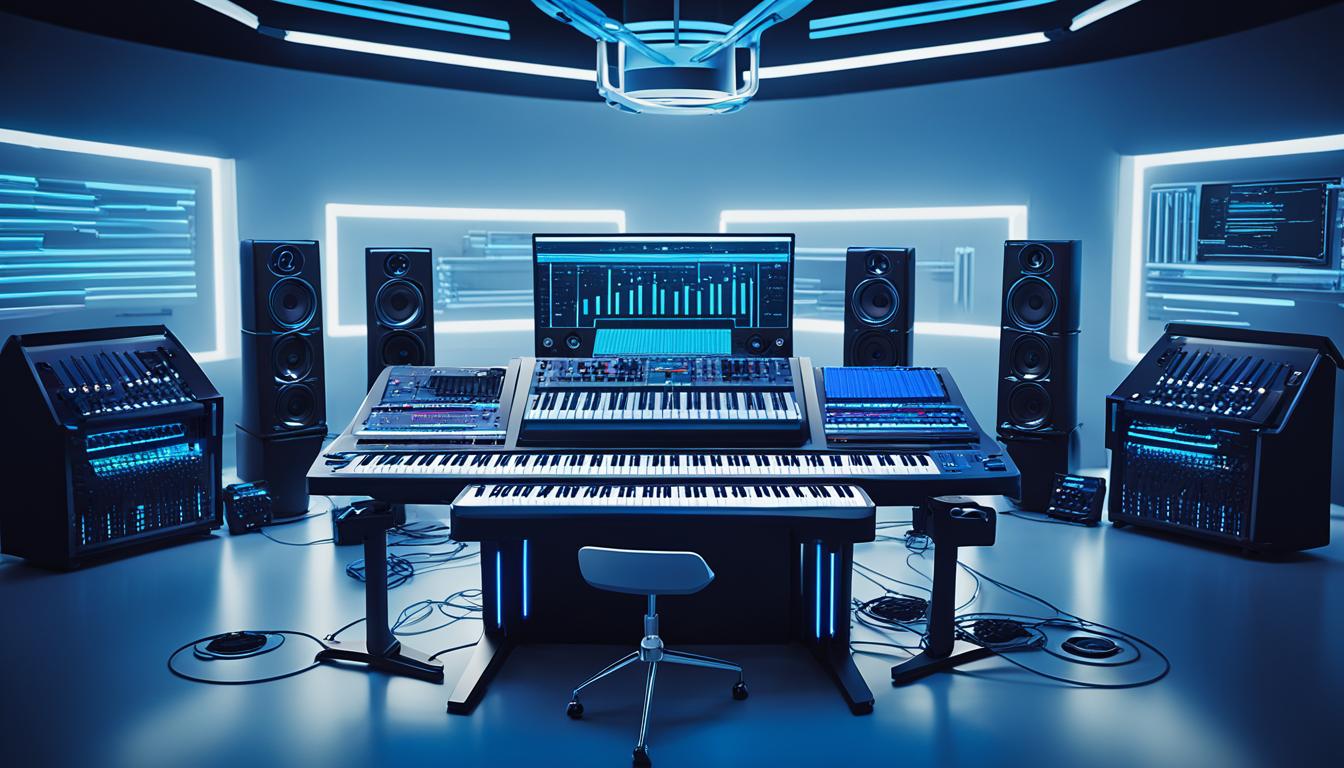
Integrating AI instruments into your compositions
Adding AI-generated instruments to your music is simple. Platforms like Amper and AIVA help you make complete songs, great for soundtracks or background music. MuseNet, from OpenAI, can create songs with up to 10 instruments in 15 styles, offering many options.
Fine-tuning AI-generated instrument tracks
After adding AI instruments, refine your sound. Tools like iZotope Ozone use AI to improve EQ, compression, and more. This AI helps make tracks sound consistent and saves time in production.
| AI Music Tool | Key Features | Best For |
|---|---|---|
| Magenta Studio | Standalone app or Ableton Live plugin | Versatile music production |
| Orb Producer Suite | Melody, bassline, and synth sound generation | Creating intricate patterns and loops |
| AIVA | Emotional soundtrack composition | Ads, video games, movies |
| iZotope Ozone | AI-driven mixing and mastering | Achieving professional sound quality |
Using these AI tools lets you explore new sounds and create professional tracks easily. Try different AI instruments and techniques to find the best sound for your next project.
Leveraging AI for Music Arrangement and Structure
AI music composition software has changed how musicians work on song structure and arrangement. These tools make the creative process easier and open up new musical ideas. They offer features to help you make great arrangements without much effort.
Using ai music composition software for arrangement helps suggest the best song structures for different genres and styles. This is super useful for new producers who find traditional arrangement hard. AI looks at lots of music data to give you insights on great song structures, making your tracks sound more professional.
Many AI music creation tools let you easily change parts of AI-made tracks. This means you can try out different song structures fast, saving time and boosting creativity. Some top AI tools also do automated transitions between song parts and create smart loops, making arranging easier.
“AI music arrangement tools have transformed my workflow. I can now create complex structures in minutes that would have taken hours before.” – Professional Music Producer
Here are tips to get the best from AI-powered arrangement tools:
- Try out various AI-generated structures
- Mix AI ideas with your own creative thoughts
- Use AI for smooth transitions between sections
- Use intelligent loop creation for repeating parts
Adding AI to your music arrangement can open up new creativity and efficiency in your work. These tools are great for both beginners and experienced musicians. They help you make tracks that are more engaging and well-structured.
| AI Music Tool | Arrangement Features | Processing Time | Starting Price |
|---|---|---|---|
| AIVA | Genre-based structure suggestions | Minutes | $7/month |
| Amper Music | Instant arrangement generation | Seconds | Custom pricing |
| Soundraw.io | Quick structure creation | Seconds | $14.99/month |
| Boomy | Rapid song structuring | Minutes | $8.99/month |
AI-Powered Mixing and Mastering Techniques
AI music composition techniques have changed how we mix and master music. These tools bring together speed and accuracy to make your tracks sound professional.
Using AI to Balance and Enhance Your Tracks
AI in music production can balance levels and position instruments for the best sound. For example, iZotope’s Master Assistant gives tailored advice for top-notch mixes. It can fix sound issues that humans might miss, making your music sound polished.
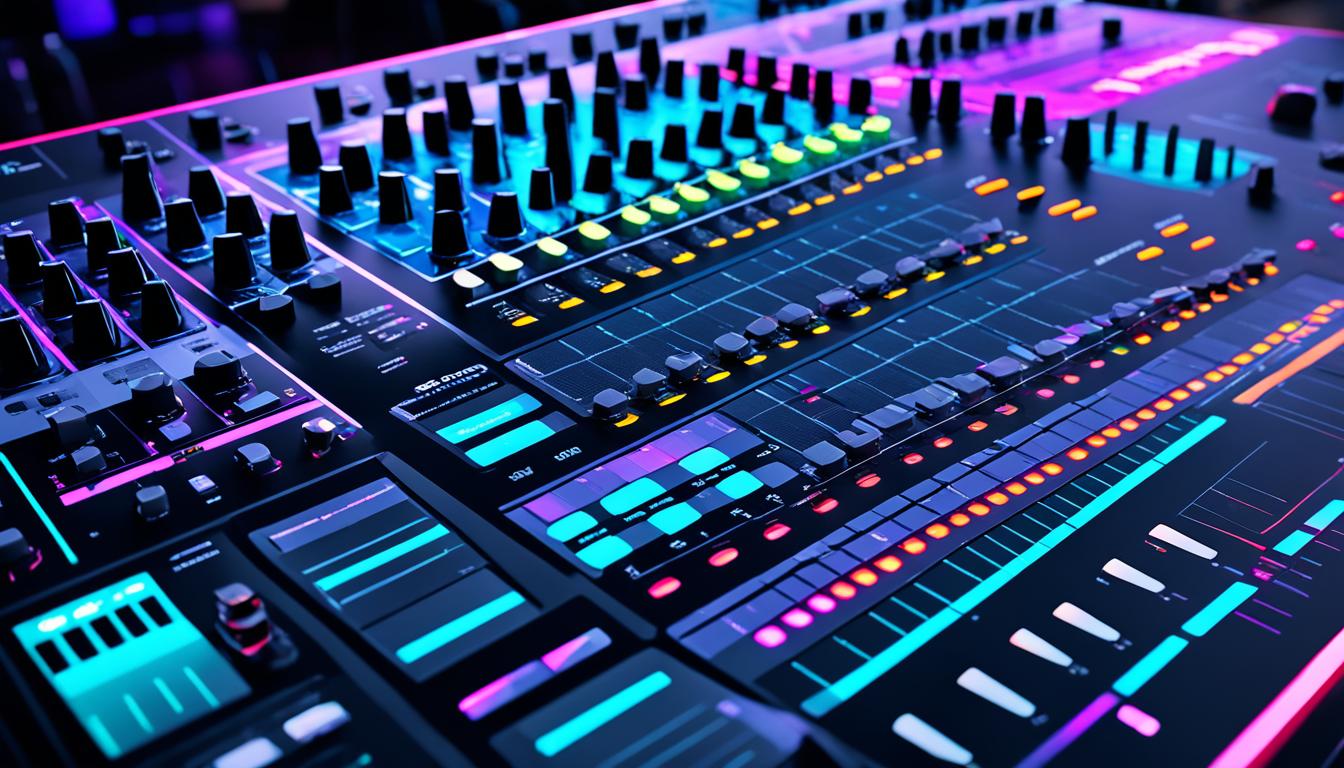
AI-assisted EQ and Compression
AI has changed how we use EQ and compression. The Sonible Smart Compressor 2 adjusts compression settings automatically. Neural Q V2 by Tone Empire offers a powerful analog EQ. These tools make mastering music simpler, especially for beginners.
Automated Mastering with AI Tools
AI helps automate mastering to improve sound quality. LANDR offers quick online mastering, adjusting loudness and more. Ozone by iZotope has many mastering features with AI tips for the sound you want.
While AI in mixing and mastering has many advantages, it’s important to mix tech with human skill. This way, your music keeps its artistic feel and emotional impact while using AI’s precision and speed.
Collaborating with AI: Human-AI Music Co-Creation
AI music creativity is changing the music world. Artists can now work with AI to make unique songs. This ai-assisted music creation process brings together human creativity and machine power. It opens up new ways to make music.
AI is making waves in music production all over the world. Places like China, India, Brazil, and Nigeria are using AI to boost their music scenes. They’re exploring how AI can help them express their culture through music.
Research centers are key to improving AI in music. The University of Illinois at Urbana-Champaign and the University of Chicago are leading the way. They’re bringing AI music creation to communities. For instance, the Hip Hop Xpress has been making music and connecting people since 2010.
Studies are proving how well humans and AI can work together in music. At the Mathemusical Encounters conference in Singapore, a study showed how AI can improve music. It used a neural network to analyze piano melodies and accompaniments.
| Initiative | Description | Year Established |
|---|---|---|
| Hip Hop Xpress | Mobile classroom and sound studio | 2010 |
| Musical Arts Institute | Music education center in Chicago | 2010 |
| House of Miles | Community music program in East St. Louis | Recent initiative |
| Project REACH | European Research Council grant for co-creativity studies | Ongoing |
As AI music tools get easier to use, artists are finding new ways to express themselves. This mix of human creativity and AI is changing music. It’s not just how music is made, but also how it’s shared and experienced across different cultures.
Overcoming Creative Blocks with AI Music Tools
Creative blocks can be tough for musicians. Luckily, ai music writing tools offer new ways to spark inspiration and bring fresh ideas. Let’s see how to use ai to make music and beat those creative hurdles.
Using AI for Inspiration and Idea Generation
Tools like Amper Music and AIVA use machine learning to create original tunes. They can make melodies, chord progressions, and even whole tracks based on what you like. By trying out different AI outputs, you can find new musical paths and get past creative blocks.
Combining AI Outputs with Human Creativity
The magic comes when you mix AI-made parts with your own creative ideas. Start with AI, then add your special touch. Mix AI melodies with your lyrics, or use AI chords as a base for your songs.
| AI Tool | Function | Benefit |
|---|---|---|
| ChatGPT | Lyric writing assistance | Suggests words and angles to overcome writer’s block |
| Magenta | Collaborative music creation | Blends human creativity with machine intelligence |
| Flow Machines | AI-assisted composition | Pioneers innovative musical projects |
Expanding Your Musical Horizons with AI
AI music tools can open you up to new genres, styles, and techniques. They look at tons of music data, showing you new song structures and arrangements. This can make your musical world bigger and inspire you to try new things.
By using AI music writing tools, you can turn creative blocks into chances for growth and new ideas. Remember, these tools are here to boost your creativity, not replace it. So, don’t hesitate to try new things and let AI help you explore new musical areas.
Legal Considerations and Copyright in AI Music Creation
As ai music composition becomes more popular, understanding the legal side is key. The UK Intellectual Property Office talked about Artificial Intelligence and IP in a public consultation. This shows how important this topic is getting. In the US, the Copyright Office is focusing on AI and copyright issues in 2023. They stress that “human authorship” is needed for copyright works.
When using tools for artificial intelligence music generation, knowing about licensing is crucial. Some platforms let you use their music for free, but others have rules. Always read the terms before adding AI music to your work. The rights to AI music can differ across platforms, so make sure to check what you’re allowed to do.
Legal issues are coming up in AI music. For example, Spotify took down thousands of songs made with machine learning because of streaming concerns. Universal Music Group removed an AI song that sounded like Drake and The Weeknd. These cases show the copyright problems with AI music. If you’re into ai music composition, keep up with these legal issues to protect your work and respect others.
FAQ
What is AI-powered music creation?
How does AI create music?
What are some popular AI music generation tools?
How do I create music with AI?
What should I consider when choosing an AI music tool?
Can AI generate melodies and chord progressions?
How can I use AI-generated instruments in my music?
Can AI assist with music arrangement?
How can AI help with mixing and mastering?
What is human-AI collaboration in music creation?
How can AI music tools help overcome creative blocks?
What are the legal considerations when using AI for music creation?
Source Links
- SOUNDRAW – https://soundraw.io/
- 5+ Best AI Music Generators of 2024 (I Tested Them All) – https://medium.com/@artturi-jalli/ai-music-generators-98575bec0e4c
- The Rise of AI in Music Production: Creative Partner or Composer Competitor – https://www.masteringthemix.com/blogs/learn/the-rise-of-ai-in-music-production-creative-partner-or-composer-competitor
- AI Music Production Part 1: The Opportunities and Challenges for Producers and Educators – Pyramind Institute – https://pyramind.com/ai-music-production-and-the-opportunities-and-challenges-for-producers-and-educators/
- How-To: Creating Music with AI Music Generators | Soundful – https://soundful.com/how-to-guide-creating-music-with-ai-music-generators/
- 10 Best AI Music Generators (July 2024) – https://www.unite.ai/best-ai-music-generators/
- Top 11 AI Music Generators in 2024 – https://www.analyticsvidhya.com/blog/2023/08/generative-ai-music-generators/
- How to Make AI Music? | Speechify – https://speechify.com/blog/how-to-make-ai-music/
- How to Generate AI Music in 2024 (Tutorial) – https://www.elegantthemes.com/blog/business/how-to-generate-ai-music
- How to Make Music With AI (8 Ways To Get Started) – https://musicmadepro.com/blogs/news/how-to-generate-music-with-ai
- Introducing Aria, your new generative AI assistant in Hookpad – http://forum.hooktheory.com/t/introducing-aria-your-new-generative-ai-assistant-in-hookpad/8082
- Needed: AI That Can Hear Music – https://www.linkedin.com/pulse/needed-ai-can-hear-music-geoff-fawcett
- AI for Music Production: 10 Tools to Produce Like a Pro – https://dittomusic.com/en/blog/ai-for-music-production-tools-for-musicians
- AI for Music Production: 3 Great Ways to Incorporate AI into your Workflow – https://turnuptoeleven.com/ai-for-music-production/
- AI Music Generator | Loudly – https://www.loudly.com/ai-music-generator
- The Rise of AI-Generated Music: What It Means for Artists » Flourish$Prosper Music Group – https://flourishprosper.net/music-resources/the-rise-of-ai-generated-music-what-it-means-for-artists/
- Leveraging AI-Generated Music for Social Media Posts – https://www.linkedin.com/pulse/leveraging-ai-generated-music-social-media-posts-audrey-desisto-h68re
- Is AI Mixing and Mastering Possible? – Mix & Master My Song – https://mixandmastermysong.com/is-ai-mixing-and-mastering-possible/
- Top 16 AI Plugins and Tools for Mixing and Mastering Music – https://www.productionmusiclive.com/blogs/news/top-7-ai-plugins-and-tools-for-mixing-and-mastering-music-in-2023
- Human collaboration with an AI musician – https://aiforgood.itu.int/event/human-collaboration-with-an-ai-musician/
- AI-Aided Music Co-Creation Platform | Discovery Partners Institute – https://dpi.uillinois.edu/ai-aided-music-co-creation-platform/
- Capturing Creativity with Computation for Music AI – https://today.ucsd.edu/story/capturing-creativity-with-computation
- 6 Ways Artists Can Use AI to Take Their Music to The Next Level – https://www.visionary-mag.com/post/6-ways-artists-can-use-ai-to-take-their-music-to-the-next-level
- AI and Music: How Artificial Intelligence is Redefining the Industry | IndieFlow – https://www.indieflow.me/blog/ai-redefining-music-industry
- AI-Generated Music and Copyright | Clifford Chance – https://www.cliffordchance.com/insights/resources/blogs/talking-tech/en/articles/2023/04/ai-generated-music-and-copyright.html
- AI-Generated Music Copyright Debate: Who Owns the Rights? – https://killthedj.com/copyright-in-ai-generated-music/
- How Much Humanity Will AI-Generated Songs Need to Be Copyrightable? (Guest Column) – https://www.billboard.com/pro/ai-generated-music-songs-copyright-legal-questions-ownership/
